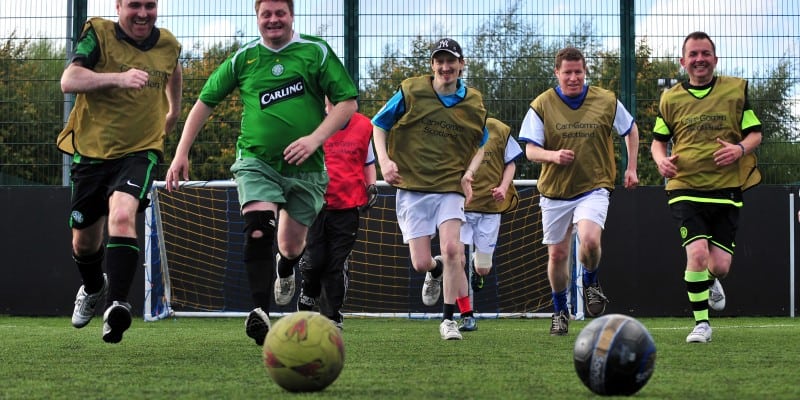
While Scotland’s health is improving, the gap in health outcomes between the most and least advantaged groups in society is widening. People who are more disadvantaged, have a lower level of income, with a lower level of education, have greater health problems, have a poorer quality of life, are sicker for longer and die at a younger age than more advantaged groups. This is what is meant by health inequalities. It is more than just differences in life expectancy across communities, it is the gap between the most advantaged and the most disadvantaged in society and how that impacts on quality of life.
These inequalities are apparent from the earliest stage in life, and their impact can build throughout a person’s life. However, the good news is that they are not inevitable; they can be prevented, reduced and reversed.
These inequalities are caused by a complex combination of factors, which cannot be solved by health agencies alone. A number of factors, such as housing, education and employment (commonly referred to as social determinants) all impact on people’s life chances and help shape individual opportunities and responses. All agencies across all sectors need to work together to eliminate inequalities.
Background
Despite successful major legislation to improve overall population health, government plans to reduce health inequalities in the most deprived parts of society have had limited success. In 2008 the Scottish Government established a ministerial taskforce for health inequalities with a remit to identify actions to reduce widening health inequalities. Its report and framework, Equally Well, and subsequent review in 2010, highlighted a number of priorities and recommendations to tackle the inequality gap.
As a result, NHS Health Scotland has refocused its attention from traditional public health information campaigns, to focus on tackling health inequalities. Their 2012-17 strategy A Fairer healthier Scotland sets out their focus to reduce health inequalities and improve health through influencing policy and practice.
VHS and the 3rd sector contribution to tackling health inequalities
As part of our commitment to building a fairer, healthier and stronger Scotland, Voluntary Health Scotland is involved in a number of activities to build on these objectives:
Throughout 2014, VHS delivered a series of events to examine how the voluntary sector can collaborate to tackle health inequalities. Each event supported voluntary health organisations to gain a better understanding of health inequalities, to share learning and experience about the interventions that make a difference, and to encourage and support collaboration and partnership between public and voluntary sectors. Click here for more information.
Health Inequalities Research Project
VHS is undertaking a research project that will showcase the work of the voluntary sector in tackling health inequalities and identify what further support we need to be able to make the most of our opportunities. This will help us to evidence the impact of the work of the voluntary sector to policy-makers, the statutory sector and the wider public. Click here for more information and to get involved.
Scottish Parliament Cross Party Group on Health Inequalities
Voluntary Health Scotland is an increasingly active member of this important Cross Party Group. It aims to raise awareness of the causes of health inequalities amongst parliamentarians, promote evidence based legislation, policy and actions that reduce health inequalities – and avoid legislation/policies that would exacerbate health inequalities. Click here for more information
Scottish Parliament and Government Consultations
Health Inequalities Policy Review – Neil Findlay MSP, Shadow Cabinet Secretary for Health and Well-Being initiated a Health Inequalities Policy Review Commission in May 2014. VHS submitted a response to this review. Click here for more information.
In March 2014, VHS submitted a response to the Health and Sport Committee’s inquiry to investigate the impact of health inequalities in the early years. Click here to access the VHS Submission – Health Inequalities in the Early Years.
On 13 March 2014, the Ministerial Task Force on Health Inequalities published its second review of Equally Well to address the underlying causes of health inequalities in Scotland. For more information on the findings of the review, click here.
On 6 November 2014, Michael Matheson, Minister for Public Health announced that the Scottish Government is to carry out a review of public health services to build on the progress made to tackle health inequalities. A review group is currently being established and it is expected that the review will begin in December 2014 and will report its first findings in summer 2015. Click here for more information.
Past Events & Member Activities
- The Gathering – In February 2014, VHS delivered an event at the gathering in collaboration with Community Health Exchange (CHEX), Community Food and Health Scotland (CFHS) and NHS Health Scotland. The purpose of this event was to examine collaborative approaches for preventing and tackling health inequalities across Scotland. To find out more and view the report of the event, click here. We also launched our make a difference… campaign to highlight some of the work that VHS members are doing to address health inequalities.
- VHS Symposium – The Voluntary Health Scotland AGM and Symposium in November 2013 discussed tackling health inequalities within the wider health and social care landscape. VHS Symposium Notes – 28 November 2013 to view the report from the event.
- Sounding Board – In October 2013, we held a Sounding Board to examine and discuss the third sector contribution to narrowing health inequalities in Scotland. Click here to view the report of findings and presentations from this event.
- Member Spotlights – In August 2013, we appointed a Health Inequalities Volunteer, James Evans, to scope and promote VHS members’ involvement in health inequalities. James produces spotlight pieces on members, which are published in our e-news bulletin and on our website. Click here to view spotlight pieces on our website. Please contact James Evans to book a visit.
